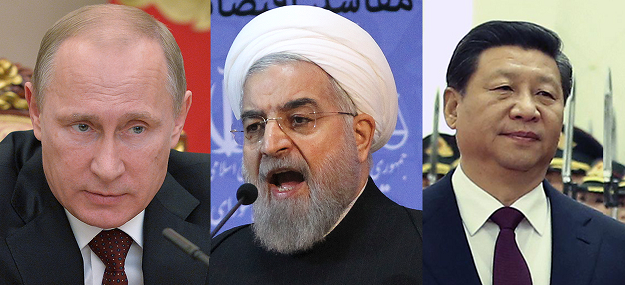End of the unipolar world
May 24, 2018 | Expert Insights

The US recently withdrew from the Iran nuclear deal and reimposed sanctions on Tehran. The intent of proposed sanctions and the ultimatum given by Mike Pompeo is to inflict severe economic damage on Iran and perhaps try to reassert a US-led unipolar world.
Is this policy realistic or unlikely to succeed?
Background
The United States has had sanctions on Iran for decades, with the first measures imposed against Iran in the early 1980s, responding to Tehran’s support for terrorism and extremism. Starting in 1995, these sanctions were expanded in response to continued Iranian sponsorship of terrorism and pursuit of weapons of mass destruction (WMD) to include a full, comprehensive embargo on bilateral trade.
In 2002, this commitment was tested by revelations that Iran was developing nuclear capabilities without providing the declarations and access to international inspectors required under the Nuclear Non-proliferation Treaty.
In 2010, the United States imposed new, secondary sanctions that increased the pressure on Iran by compelling foreign companies and banks to withdraw from Iran.
Analysis
Iranian President Hassan Rouhani has rejected demands made of Tehran by US Secretary of State Mike Pompeo, vowing to continue “our path,” insisting that the era when the US could “decide for the world” is over. “Who are you to decide for Iran and the world? The world today does not accept America to decide for the world, as countries are independent ... that era is over ... We will continue our path with the support of our nation,” Rouhani said, as quoted by ILNA news agency.
Pompeo’s speech prompted a comment by Iranian Foreign Minister Javed Zarif on his Twitter page. “US diplomacy sham is merely a regression to old habits: imprisoned by delusions & failed policies—dictated by corrupt Special Interest—it repeats the same wrong choices and will thus reap the same ill rewards. Iran, meanwhile, is working with partners for post-US JCPOA solutions,” Iran’s top diplomat tweeted.
Speaking at the Heritage Foundation, a right-wing Washington think tank, Pompeo laid out a list of 12 “basic requirements” for Iran. The demands call on Iran to close heavy water reactors , allow IAEA inspectors everywhere, end ballistic missiles , withdraw from Syria, release all US citizens, end support for Hezbollah, Hamas and Houthi rebels in Yemen, stop “enrichment" of uranium, support the government of Iraq and disarm Shia militias, promise never to process plutonium .
What is evolving in response to the US dropping out of the JCPOA is a new world order that could begin to see Iran, China, Russia, Eastern European and Central Asian countries creating their own economic engine to minimize the impact of US influence. It could include a reinvigorated Shanghai Cooperation Organization founded by China and Russia and Central Asian countries. With China nearing completion of its One Belt, One Road Initiative from Asia to Europe, it could open the way for European countries who are members of the EU and Eastern Europe to expand trade and escape the yoke of weaponized US economic influence.
In response to Trump’s recent action on the JCPOA, Russian President Vladimir Putin could once again extend an invitation to Iran to join the SCO. The foreign minister of France has warned that the United States risks more problems in the Middle East if it places new restrictions on Iran. The EU has announced a package of measures last Friday to counter US sanctions on Iran, setting up a potential new conflict with Washington as Europe fights to save a landmark nuclear deal with Tehran.
Iranians may also have other legal advantages. The language of most of the extraterritorial sanctions approved by the US made reference to UN Security Council resolutions, giving it the imprimatur of international law when it was scrutinized by foreign courts. Those Security Council resolutions were removed as part of the nuclear deal. Without the approval of China and Russia, which approved the sanctions during the interregnum when Vladimir Putin had stepped back into the prime minister’s seat and Dmitry Medvedev was president, there is zero chance those sanctions could be resurrected.
Assessment
Our assessment is that the primary objective of this economic warfare against Iran is a regime change. We believe that the US demand has less chance to succeed now. We believe that a parallel objective of imposing economic hardship is to create unrest internally in Iran so that they would interfere less in the region. We sense that the US move is more likely to alienate its European allies, bring Russia, China, and Iran together and perhaps gladden Iranian hardliners for more reason to start its nuclear program. Pompeo is perhaps signalling an effort to reassert US leadership on Middle East countries.








Comments